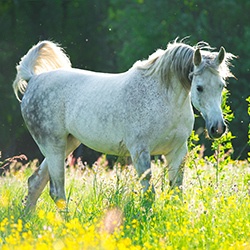
The Liver
The multi-talent among organs
It is said that many horses suffer from liver problems, and there's much evidence of this being true. However, by the time a horse shows visible signs, the damage can be severe. In this article you'll learn everything you need to know about your horse's liver.
More than just an appendage: important liver functions
The liver is the largest accessory digestive organ found in vertebrates, including horses, and is of vital importance for a number of digestive and metabolic processes. If this organ becomes diseased, various clinical pictures may develop.
The liver is indeed a true multi-talent which plays a key role in fat, carbohydrate, and protein metabolism. Nutrients such as fats, sugars, amino acids, trace elements, and vitamins enter the liver through the portal vein. The liver cells then break down, convert, or store these nutrients as needed. In this way, the liver forms new fuels and reserves for the body to use. Another important function of the liver is the formation of bile and bile acids. These help to digest fat and to absorb fat-soluble vitamins. Because horses do not have gall bladders, bile is not stored, but rather sent directly and continuously to the small intestine.The liver aids in the regulation of hormone balance through activation or inactivation of transmitters and hormones. With its abundance of defence cells, it is an important component of non-specific immune defence. It can also store and release blood.
When a horse's liver shows signs of problems...
The liver is best known for its detox function, i.e., it breaks down harmful substances (foreign
 substances as well as the body's own) and eliminates them with the help of bile and the kidneys. If this function is hampered or stopped, it may have serious health-related effects for the body. Liver diseases can be identified relatively easily by means of a blood count or measuring liver enzyme levels. These enzymes are released by damaged liver cells and then enter the bloodstream.
substances as well as the body's own) and eliminates them with the help of bile and the kidneys. If this function is hampered or stopped, it may have serious health-related effects for the body. Liver diseases can be identified relatively easily by means of a blood count or measuring liver enzyme levels. These enzymes are released by damaged liver cells and then enter the bloodstream.However, elevated liver enzyme levels in horses are often detected during routine veterinary blood tests without observable clinical symptoms. This is because of the liver's enormous compensating and regenerating capacities. Clinical symptoms thus appear only after damage to more than 80% of liver tissue. The occasional elevation in liver enzyme levels in blood counts presents no cause for panic, as one may measure elevated levels that are not yet indicative of disease.
An important indicator for determining liver insufficiency is the horse's serum bile acid level.
Physical signs of low-grade liver damage can be somewhat uncharacteristic and ambiguous:
- Weakness
- Reduced performance
- Loss of appetite
- Yawning
- Apathy
- Distended abdomen, recurrent mild colics
Clinical symptoms of advanced liver damage or liver insufficiency:
- Jaundice (icterus) of non-pigmented skin, especially of mucous membranes
- Weight loss
- Muscle atrophy
- Changes in behaviour, disturbances to the central nervous system
… the search for possible causes begins
If a blood count shows unusually elevated liver enzyme levels, both diet-related and non-diet-related causes should be explored. In most cases, pinpointing the cause may be extremely difficult. For most "incidental findings", no special dietary measures are necessary. However, it won't hurt to review the feed plan for "non-essentials" and to adjust the ration to meet the horse's actual requirements.
Diet-related causes may include:
- Poor quality of forage and concentrates, the presence of moulds and/or mycotoxins in the feed
- Faulty feed management, for example too much concentrate feed
- The presence of poisonous plants in the forage
- Contaminated drinking water
- Fatty liver disease resulting from hyperlipidaemia
Non-diet-related causes may include:
- Parasite infestation, e.g. liver fluke
- Infectious diseases
- Certain medications
- In rare cases, tumours
Problems with the liver require not only treatment of the underlying condition, but also an adjustment to the feed and regular monitoring of liver values. Always consult with the attending veterinary surgeon to determine whether dietary measures are necessary. Some changes in the liver, like cirrhosis or fatty liver disease, cannot be reversed through dietary changes. However, appropriate dietary measures can reduce the results of insufficient detoxification.
Tips for feeding horses with liver problems:
- Feed your horse top-quality forage
- Complementary and concentrate feeds can be given in several small meals over the course of the day to avoid intermittent surges in protein breakdown products. Blood sugar levels should be kept constant to prevent the body from using its own substance as a source of energy
- High-quality vegetable oils in moderation can provide energy if they are well tolerated by the horse's body. If a deficiency of bile acid reduces the capacity to digest fat, a feed that is too high in fat will result in changes in the faeces
- The absorption and storage capacity of fat-soluble vitamins (A, D, E) can be reduced, at the same time there will be a higher requirement of vitamin C. A mineral feed with added vitamins will help in this case
- Horses with acute liver diseases should be fed a low-protein feed, e.g. hay from a late first cutting at the end of the flowering period. Avoid feeding early-cut hay or haylage if possible
- Sparing use of high-quality protein carriers can help to prevent a deficiency of essential amino acids
- Toxic plant management: diligent pasture and grassland maintenance can prevent or minimise the presence of unwanted and harmful plants in pasture grass or hay
Suitable complementary feeds for horses with liver problems include our Pre Alpin® Protein Light Flakes as well as our Maiscobs and OMEGA3 Pur for horses with higher energy requirements. Maiscobs are especially low in protein whilst high in fibre through the use of the whole maize plant.
"Easy-doer" horses and ponies with elevated enzyme levels will benefit from low-protein, low-energy LeichtGenuss used as a concentrate alternative or as a supplement to base feed.
Horses with liver problems can have their mineral and vitamin requirements met with our Seniormineral, which can also be combined with our Amino Pur for a targeted supply of essential amino acids.The use of herbs can offer natural support to the liver in its function as a detoxification organ: Bergsiegel Herbs for Liver Health and Bergsiegel Milk Thistle contain a variety of secondary plant substances that have positive effects on liver function.
Daniela Hanke, B.Sc. Agriculture
June 2021, © AGROBS GmbH
June 2021, © AGROBS GmbH
Sources:
- Brehm, W.; Gehlen, H.; Ohnesorge, B. et al. (Publishers): Handbuch Pferdepraxis. 4th completely revised and expanded edition. Enke Verlag, Stuttgart, 2016
- Coenen, M.; Vervuert I.: Pferdefütterung. Georg Thieme Verlag KG, Stuttgart, 2020
- Gäbel, G.; Loeffler, K.; Pfannkuche, H.: Anatomie und Physiologie der Haustiere. 15th completely revised and expanded edition, Eugen Ulmer Verlag, Stuttgart, 2018
- Salomon, F.; Geyer, H.; Gille, U., publishers: Anatomie für die Tiermedizin. 4th updated edition. Georg Thieme Verlag KG, Stuttgart, 2020
- Wöckener, A.: Diagnostik von Lebererkrankungen beim Pferd. Pferdespiegel 2014;4, Enke Verlag in MVS Medizinverlage Stuttgart GmbH & Co. KG Stuttgart · New York, 2014



